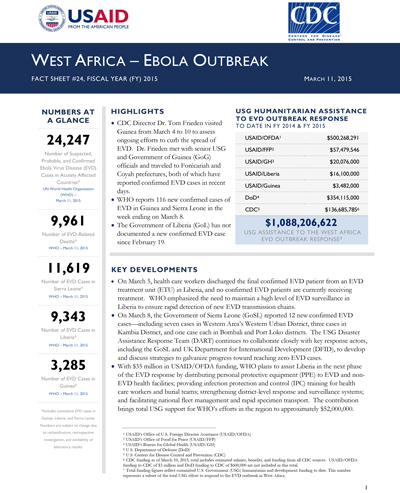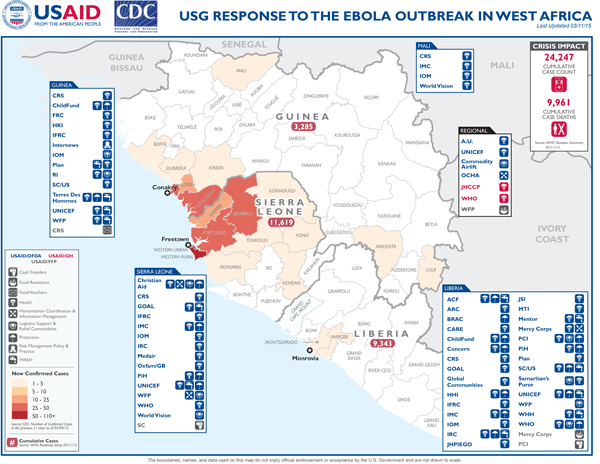Speeches Shim
March 11, 2015
HIGHLIGHTS
Ebola Response
Visit our main West Africa Ebola Outbreak page to learn more about how we're responding to the West Africa Ebola outbreak, and what you can do to help.
- CDC Director Dr. Tom Frieden visited Guinea from March 4 to 10 to assess ongoing efforts to curb the spread of EVD. Dr. Frieden met with senior USG and Government of Guinea (GoG) officials and traveled to Forécariah and Coyah prefectures, both of which have reported confirmed EVD cases in recent days.
- WHO reports 116 new confirmed cases of EVD in Guinea and Sierra Leone in the week ending on March 8.
- The Government of Liberia (GoL) has not documented a new confirmed EVD case since February 19.
West Africa Ebola Outbreak Fact Sheet #24 (FY 15) ![]() (pdf - 364k)
(pdf - 364k)
KEY DEVELOPMENTS
- On March 5, health care workers discharged the final confirmed EVD patient from an EVD treatment unit (ETU) in Liberia, and no confirmed EVD patients are currently receiving treatment. WHO emphasized the need to maintain a high level of EVD surveillance in Liberia to ensure rapid detection of new EVD transmission chains.
- On March 8, the Government of Sierra Leone (GoSL) reported 12 new confirmed EVD cases—including seven cases in Western Area’s Western Urban District, three cases in Kambia District, and one case each in Bombali and Port Loko districts. The USG Disaster Assistance Response Team (DART) continues to collaborate closely with key response actors, including the GoSL and UK Department for International Development (DFID), to develop and discuss strategies to galvanize progress toward reaching zero EVD cases.
- With $35 million in USAID/OFDA funding, WHO plans to assist Liberia in the next phase of the EVD response by distributing personal protective equipment (PPE) to EVD and non-EVD health facilities; providing infection protection and control (IPC) training for health care workers and burial teams; strengthening district-level response and surveillance systems; and facilitating national fleet management and rapid specimen transport. The contribution brings total USG support for WHO’s efforts in the region to approximately $52,000,000.
West Africa Ebola Map #24 March 11, 2015 ![]() (pdf - 546k)
(pdf - 546k)
Liberia
As of March 10, the GoL Incident Management System had not documented a new confirmed case of EVD since February 19. All known contacts of confirmed EVD cases graduated from observation on March 11, according to the GoL.
Staff from the CDC are supporting the GoL to prevent cross-border EVD transmission, with a focus on early alert systems; rapid investigation of suspected cases and community deaths; and preparedness at border checkpoints and health clinics. CDC staff are also training GoL officials from the Bureau of Immigration and Naturalization, airport firefighters, and other personnel in basic IPC activities and use of PPE.
Between March 4 and 7, members of the DART traveled to northeastern Liberia’s Nimba County near the Guinea–Liberia border. GoL officials confirmed that unofficial cross-border travel continues to occur, and the Nimba county health officer (CHO) reported that Guineans from border communities often seek medical treatment in Nimba’s Ganta town. The CHO is coordinating with non-EVD medical facilities, the GoL, and GoG officials to develop procedures for responding to suspected EVD cases originating from Guinea. Partners of USAID/OFDA—including Childfund, Mercy Corps, and Project Concern International (PCI)—met with the DART to discuss ongoing EVD response efforts in Nimba.
On March 7, USAID/OFDA partner Global Communities, in coordination with the GoL, transferred the remains of EVD victims cremated at the GoL-managed crematorium to a burial vault at the Global Communities-managed Disco Hill national burial site. The GoL and Global Communities conducted a two-part service at the crematorium and the burial site to memorialize the EVD victims and help bring closure to their families.
Sierra Leone
Since early February, the EVD caseload in Kambia District has plateaued, according to the GoSL. The Kambia District Ebola Response Center reported 16 new confirmed EVD cases in the district between February 20 and March 5 and reiterated concerns regarding ongoing community resistance to EVD response activities and the possible underreporting of cases in Kambia.
In collaboration with the local non-governmental organization (NGO) Lifeline, USAID/OFDA partner Medair continues to provide critical assistance to quarantined households in Western Area via 20 three-person quarantine teams. Each Medair-supported team visits a quarantined area each day to screen residents and disseminate key EVD treatment and prevention messages. To date, the teams have reached more than 2,670 quarantined households—approximately 8,640 individuals—with monitoring services and EVD response commodities, such as hygiene kits. The teams reached each quarantined individual at least once per day for the full 21-day monitoring period.
USAID/OFDA is supporting the International Organization for Migration (IOM) mobile training teams to provide specific needs-based EVD and IPC training throughout Sierra Leone. Since piloting the first mobile training in Bo District during the week of January 26, IOM mobile teams have implemented an additional eight multi-day courses. In total, IOM had reached nearly 230 participants—including ambulance, decontamination, and swab team members in four districts—with general IPC measures, PPE, and decontamination training as of March 9.
Guinea
On March 9, WHO and the GoG reported 15 new confirmed EVD cases, including eight in Forécariah Prefecture, four in the capital city of Conakry, two in Boffa Prefecture, and one in Coyah Prefecture. In potential correlation to increased reporting of EVD cases, WHO and the GoG are noting reduced community reticence, with response teams signaling reticence in only three sub-prefectures on March 9—a decrease since March 1 when 10 sub-prefectures were identified as reticent. Of the 13 community deaths reported on March 9, three of the community deaths tested positive for EVD and 12 individuals received safe and dignified burial.
During Dr. Frieden’s visit to Guinea, he met with Head of the National Ebola Coordination Cell Dr. Sakoba Keita, the U.S. Ambassador to Guinea Mark Laskaris, the GoG Minister of Health Colonel Remy Lamah, and USAID/OFDA and 3 CDC staff. At the end of his visit to Guinea, Dr. Frieden stressed the need to better support EVD case and contact management, scale up sample collection and testing, and reduce community reticence to improve the EVD response.
On March 6, Dr. Frieden, accompanied by several members of the DART, traveled to Coyah Prefecture’s Kendoumaya village, a community previously resistant to EVD response efforts. To counter reticence in Kendoumaya, USAID/OFDA partner Plan International has been implementing awareness-raising activities and distributing hygiene kits. To date, the organization has reached 240 households with EVD messages.
On March 7, the Central Pharmacy of Guinea (PCG) began distributing 52,000 kilograms of USAID/OFDA-procured chlorine to Conakry health facilities, including hospitals, private clinics, and the Conakry ETU. With this chlorine, PCG anticipates having sufficient chlorine stocks through the end of April.
The Guinean Red Cross (GRC) is implementing a new strategy to improve communication with EVD-affected communities. Beginning in Conakry during the week of March 9, GRC will deploy a hygienist, an EVD sample collector, and a communicator together with investigation teams responding to community death alerts. The new team will help prepare families for the arrival of the GRC safe and dignified burial teams by speaking with family members about burial procedures, answering questions, and demonstrating how to use PPE. At present, more than 70 GRC burial teams are operating in Guinea. Between January 10 and March 7, GRC provided safe and dignified burials for 230 individuals, or approximately 70 percent of the 330 community deaths reported to response actors.
FOOD SECURITY AND LIVELIHOODS
During the week of March 2, two staff from USAID/FFP visited multiple sites in rural Sierra Leone to assess food security conditions in coordination with GoSL officials, UN agencies, and other stakeholders. The assessment found key food security-related challenges resulting from the EVD outbreak, include market disruptions, decreased household access to food, and continued government restrictions on public gatherings, market operations, and public transport. Households report reduced purchasing power and poor access to seeds, which may result in decreased planting in the upcoming April–May sowing season.
With USAID/FFP support, the UN World Food Program (WFP) and its implementing partners are providing food assistance to households under observation in Liberia. Food distributions limit the need for EVD contacts to travel to local markets, thereby minimizing possible EVD exposure for others in the community. Between February 28 and March 4, WFP reached 51 households in 15 communities in Montserrado County with food rations, including rice, beans, oil, and fortified cereal.
PUBLIC DONATION INFORMATION
- The most effective way people can assist relief efforts is by making cash contributions to humanitarian organizations that are conducting relief operations. A list of humanitarian organizations that are accepting cash donations for disaster responses around the world can be found at www.interaction.org.
- USAID encourages cash donations because they allow aid professionals to procure the exact items needed (often in the affected region); reduce the burden on scarce resources (such as transportation routes, staff time, and warehouse space); can be transferred very quickly and without transportation costs; support the economy of the disaster-stricken region; and ensure culturally, dietary, and environmentally appropriate assistance.
More information can be found at:
- The Center for International Disaster Information: www.cidi.org or +1.202.821.1999.
- Information on relief activities of the humanitarian community can be found at www.reliefweb.int.
USAID/OFDA bulletins appear on the USAID website at what-we-



Comment
Make a general inquiry or suggest an improvement.